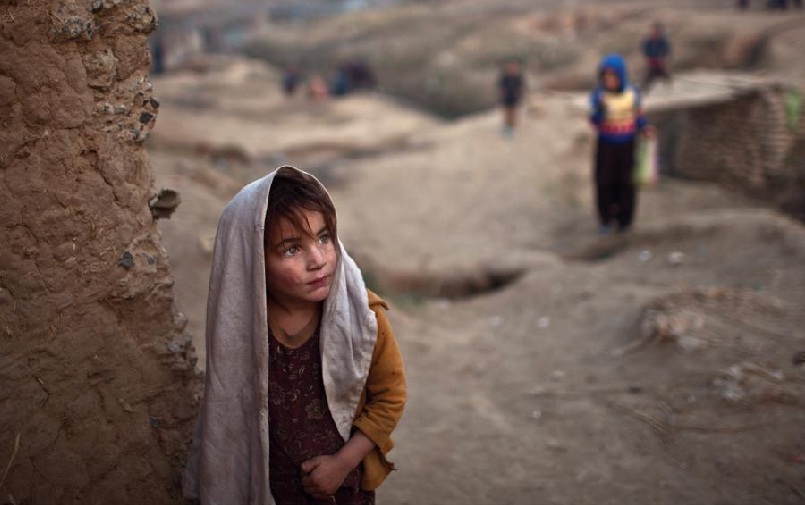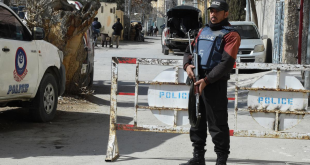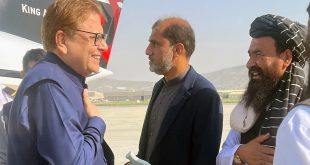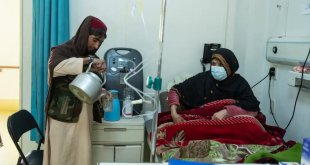Pakistan’s government should take all necessary measures to end the rampant police harassment, threats, and violence against Afghans living in Pakistan, Human Rights Watch said today in a new report. Incidents of police abuses against Afghans have skyrocketed since the Pakistani Taliban attacked a school in Peshawar in December 2014, and is prompting many many Afghans to return to war-torn Afghanistan and possibly seek asylum in Europe.
“The Pakistani police’s outrageous mistreatment of Afghans over the past year calls for an immediate government response,” said Phelim Kine, deputy Asia director. “The Pakistani government should press the police to apprehend perpetrators of atrocities instead of scapegoating the entire Afghan community.” The 37-page report, “‘What Are You Doing Here?’: Police Abuses against Afghans in Pakistan,” documents myriad rights violations against Afghans in Pakistan since December 2014. The Pakistani government is obligated to ensure that all law enforcement and other government officials treat Afghans living in Pakistan with dignity and respect for their human rights in compliance with domestic and international law. Ending police abuses and ensuring that Afghans are treated fairly should be a first step toward formulating a viable legal framework to manage the Afghan population in Pakistan. Human Rights Watch interviewed 50 Afghans who had returned to Afghanistan after living many years in Pakistan, and 46 Afghans living in Pakistan, as well as Pakistani and Afghan government officials, staff of nongovernmental and community-based organizations, United Nations refugee agency officials, diplomats, journalists, and other experts.
Pakistan is host to one of the largest displaced populations in the world. The 1.5 million registered Afghan refugees and 1 million undocumented Afghans that the UN High Commissioner for Refugees (UNHCR) estimates are living in Pakistan as of November 2015 include many who fled conflict and repression in Afghanistan during the late 1970s and early 1980s, and their descendants. Some arrived as children, grew up in Pakistan, married, and had children of their own who have never lived in Afghanistan. Others have arrived in the decades of turmoil in Afghanistan since, seeking security, employment, and a higher standard of living.
Afghans in Pakistan have experienced a sharp increase in hostility since the so-called Pakistani Taliban, Tehreek-i-Taliban Pakistan, attacked the Army Public School in Peshawar on December 16, 2014, killing 145 people, including 132 children. The Pakistan government has responded to that attack with repressive measures including the introduction of military courts to prosecute terrorism suspects, the lifting of an unofficial moratorium on the use of the death penalty, and proposals to register and repatriate Afghans living in Pakistan. On June 23, the federal minister for the Ministry of States and Frontier Regions, Gen. (retired) Abdul Qadir Baloch, announced that there would be no official reprisals against the country’s Afghan population in response to the Peshawar attack. Despite that promise, Pakistani police have pursued an unofficial policy of punitive retribution that has included raids on Afghan settlements; detention, harassment, and physical violence against Afghans; extortion; and demolition of Afghan homes.
Police abuses have prompted fearful Afghans to restrict their movements, leading to economic hardship and curtailing access to education and employment. This oppressive situation has prompted large numbers of Afghans to return to Afghanistan, where they face a widening conflict and continuing insecurity. Deteriorating conditions in Afghanistan have already prompted more than 80,000 Afghans to leave their country in 2015 and seek asylum in Europe. Afghans uprooted by police abuses in Pakistan, where many have lived for decades, to return to Afghanistan may well add to the numbers of those seeking refuge in Europe as conditions deteriorate in Afghanistan.
The Afghan men and women Human Rights Watch interviewed described how the increasingly hostile climate for Afghans in Pakistan had left them feeling trapped: fearful of returning to Afghanistan, of Pakistani police raiding their homes and workplaces, and of paying bribes to the police to avoid arrest and detention. Many Afghans told Human Rights Watch that they returned to Afghanistan because the rampant extortion meant they could no longer make ends meet in Pakistan.
“Pakistan’s government has a responsibility to prevent and prosecute terrorist attacks,” Kine said. “But permitting police reprisals against the Afghan population is neither lawful nor effective in combatting terrorism.”
UNHCR said in its August and September 2015 reports, “[i]n general, eviction notices by the authorities, harassment, intimidation, movement limitations, economic factors, settlement closure/consolidation and fear of arrest and/or deportation were mentioned by interviewed [Afghan] returnees as the main push factors of return from Pakistan so far this year.”
Pakistan’s allies should press the government to end abuses by security forces against Afghan refugees and undocumented Afghans. Donors should consider providing additional support to Pakistan and Afghanistan to assist with the Afghan refugee population in Pakistan and returnees in Afghanistan, including improving their access to education services, healthcare, housing, and land. UNHCR should work closely with the Pakistani government to ensure that all undocumented Afghans seeking protection in Pakistan are able to register with UNHCR. The government of Afghanistan has the responsibility to ensure that all Afghan returnees have the freedom to settle where they wish and have access to government health, education, and land allocation services regardless of their registered status in Pakistan.
“There is a simple reason why Pakistan police abuse of Afghans continues: the government is allowing police to get away with it,” Kine said. “The Pakistani government needs to develop a long-term strategy that emphasizes the protection of its Afghan population rather than pursue a vindictive punishment policy that is as unlawful as it is inhumane.”
Accounts From “What Are You Doing Here?”
Karim, 42, currently living in Peshawar, is originally from Afghanistan’s Laghman province. He came to Pakistan with his family in 1985. He told Human Rights Watch that harassment by police and district administration officials was threatening his business and frightening his family members:
I am very afraid now. I can no longer afford to pay bribes. They [police] ask for bribes daily. The district administration fines us [Afghans] for no reason.… If you ask the district administration or the police about these fines, they hit us. My brother, who also works with me, was hit with a weighing stone by the police for not having the bribe money. He had to have stitches in his head after that. The police did not used to beat us much before [the Peshawar school attack of] December 16, 2014. Now they torture us for no reason. I am afraid that one day when I won’t have bribe money, they will kill me. None of my other family members except me and my brother leave the house now. Our children do not go to school; they do not even go to play outside anymore.
Farhang, 31, originally from Parwan, went to Pakistan with his family in 1992 when he was 8-years-old. They settled in the Peshawar area where his father found work as a taxi driver. Farhang eventually found work driving a motorized rickshaw taxi. He told Human Rights Watch:
The police started creating problems. They were going into people’s homes. They came to our house and kicked in the door – this was after the [Peshawar] school incident. The children were very afraid. The police asked us, “What are you doing here? – Go to your own country!” This was about a month ago [early July 2015]. It was 1 a.m. They put all us men in the police cars and took us to the police station. We spent 11 days in jail. Then they took us to the border and told us to cross. I crossed, but then [a few days later] I returned to take my wife and child to Afghanistan. So I came to Kabul but I don’t have any work here [or] a place to live.
Jalal Shah, 50, is a vegetable vendor originally from Nangarhar province in Afghanistan, and has been living in Peshawar for 20 years. Shah has a Proof of Registration Card, which identifies him as a refugee with the right to reside temporarily in Pakistan. His shop was destroyed in a September 30, 2015 raid, and since then the police have continued to harass him. He told Human Rights Watch:
The traffic police come almost every day now. They literally loot and plunder the shops, demand bribe money from whomever they want, and take away anything that they wish. I don’t have a shop now and I sell my vegetables by the side of the road. However, I did have a shop – a wooden, covered stall – until a month ago. The traffic police along with some people of the district administration came in the last days of September. The police officers took away all my vegetables and demolished my shop. The demolition continued the entire day and demolished almost every shop in the market. The police say that we Afghans have no right be here and do business.
Abdullah, 55, and his brother Rohullah, 32, left Paktia province in Afghanistan as children in the early 1980s, shortly after the Soviet invasion. Their families settled in Kohat camp in Pakistan, then moved into the town where both eventually became motorized rickshaw drivers. They experienced intensive police harassment after the Peshawar school attack through July 2015, when they decided to return to Afghanistan. Abdullah said:
Last year [after the Peshawar school attack], the police started arresting people. The reason we came back to Afghanistan was because the police started coming to people’s homes. So that’s why—we didn’t want them to come into our home. From our camp, most men were taken. Police came in the middle of the night to take them to jail and then deport them. When they come at night they don’t care if you are wearing shoes or how you are dressed – they just take you to the jail and then deport you. Everyone knew – the elders of the camp told us, “You should go or the police will arrest and deport you.” (HRW)
 Afghanistan Times
Afghanistan Times




